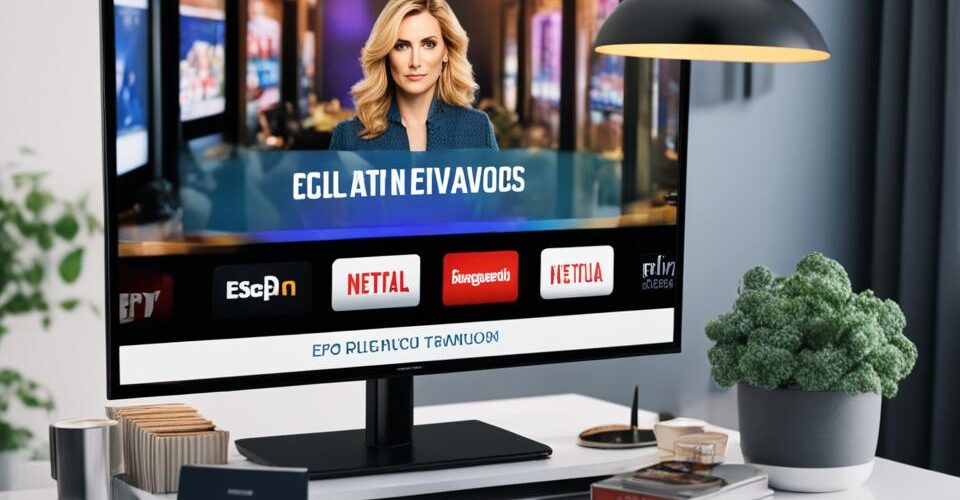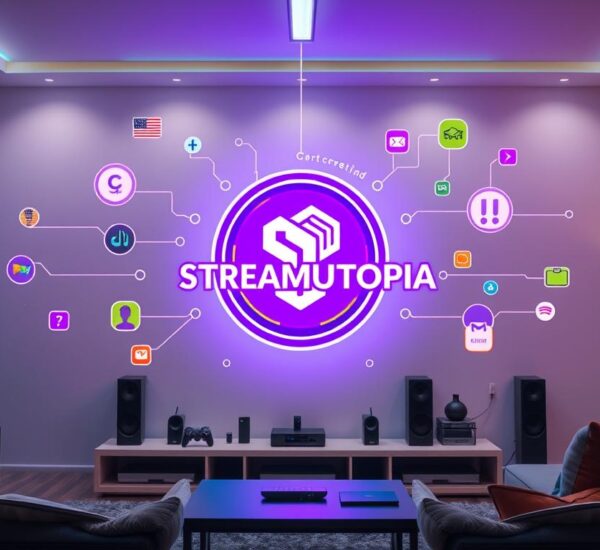In an era dominated by rapid technological advancements, the transition from traditional television to Internet Protocol Television (IPTV) represents more than just a shift in viewing habits—it’s a journey that can profoundly impact our psychological well-being. IPTV offers a sense of autonomy and control over one’s entertainment choices, allowing viewers to curate their experience. Additionally, IPTV platforms foster enhanced engagement and immersion through interactive features, creating a more personalized entertainment experience.
Key Takeaways:
- IPTV offers viewers autonomy and control over their entertainment choices.
- Interactive features in IPTV platforms enhance engagement and immersion.
- The transition from traditional TV to IPTV can have psychological effects.
- Curating content choices and practicing mindfulness is important for a healthy viewing experience.
- IPTV is shaping the future of content consumption and the way we engage with media.
The Comfort of Familiarity: Navigating the Change
When it comes to entertainment, many individuals have a deep-seated sense of familiarity and nostalgia with traditional TV. The thought of transitioning to Internet Protocol Television (IPTV) may initially seem daunting. However, embracing this change opens up a world of possibilities, offering diverse content options and customized features tailored to individual preferences.
Unlike traditional TV, IPTV provides viewers with a greater sense of autonomy and control over their entertainment choices. With IPTV, you have the power to curate your own personalized viewing experience, selecting the shows, movies, or documentaries that resonate with you the most. This newfound freedom enables you to explore and discover a vast array of content that goes beyond the limitations of traditional TV.
Navigating the change from traditional TV to IPTV requires adapting to new streaming services and digital interfaces. As with any transition, there may be a learning curve involved. However, the benefits far outweigh the initial challenges. IPTV platforms offer intuitive navigation systems that make it easy to browse and access your favorite content. Seamless user interfaces and interactive program guides enhance the overall viewing experience, ensuring that you can find what you’re looking for effortlessly.
To help you get started on your IPTV journey, here are some essential navigation tips:
- Familiarize yourself with the IPTV platform’s user interface and menu options.
- Explore the various categories and genres to discover new content.
- Take advantage of search functionalities to find specific shows or movies.
- Bookmark your favorite channels or programs for quick access.
- Personalize your viewing experience by creating profiles and setting preferences.
Embracing the change from traditional TV to IPTV may seem unfamiliar at first, but it opens up a world of endless entertainment possibilities. By adapting to new streaming services and exploring the intuitive navigation features, you can fully immerse yourself in the digital era of television.
Freedom of Choice: Empowering Viewers
One of the significant benefits of IPTV is the freedom of choice and customization it offers. Unlike traditional TV, IPTV allows viewers to curate their viewing experience according to their interests and preferences. This includes binge-watching favorite shows or exploring niche content genres. The ability to have autonomy and control over entertainment choices empowers viewers and enhances their overall experience.
IPTV vs. Traditional TV: A Comparison
To better understand the extent of choice and customization provided by IPTV, let’s compare it to traditional TV:
| IPTV | Traditional TV | |
|---|---|---|
| Content Variety | IPTV offers a vast library of content from various genres and platforms, providing viewers with a wide range of options. | Traditional TV has limited channels and schedules determined by network programming. |
| On-Demand Viewing | IPTV allows viewers to watch their favorite shows and movies at their convenience, providing flexibility and eliminating the need to adhere to fixed broadcasting schedules. | Traditional TV follows set programming schedules, limiting the viewer’s ability to watch content on their terms. |
| Customizable Experience | IPTV platforms offer personalized recommendations based on viewing history and preferences, allowing viewers to discover new content tailored to their interests. | Traditional TV lacks personalized recommendations, leaving viewers reliant on network programming and traditional advertising for content suggestions. |
In addition to the points mentioned above, IPTV provides viewers with the flexibility to pause, rewind, or fast-forward through content, enabling a more interactive and intuitive viewing experience. Viewers can also create profiles for individual family members, ensuring each person’s preferences and recommendations are personalized.
Enhanced Engagement: Immersion in Interactive Experiences
IPTV platforms offer viewers a more immersive and engaging entertainment experience through the integration of interactive features. These features go beyond passive consumption, allowing viewers to actively participate and shape their own viewing experience.
Live Chat Functionalities
- Live chat functionalities enable viewers to connect with other fans in real-time, fostering a sense of community and shared enthusiasm for the content. This interactive element enhances the overall enjoyment and makes the viewing experience more social.
- Viewers can discuss their favorite moments, speculate about plot twists, and share their reactions, creating a vibrant and dynamic environment that extends beyond the screen.
Interactive Polls and Quizzes
- Interactive polls and quizzes allow viewers to actively participate in the content they are watching, making it more interactive and engaging.
- Through these features, viewers can express their opinions, predict outcomes, and test their knowledge, adding an element of excitement and challenge to the viewing experience.
On-Demand Content
The availability of on-demand content on IPTV platforms empowers viewers to engage with their favorite shows at their convenience, leading to a more personalized and fulfilling entertainment experience.
With the flexibility to watch episodes back-to-back or at their own pace, viewers can fully immerse themselves in the storyline and characters without having to wait for scheduled broadcasts.
The inclusion of interactive features and on-demand content in IPTV platforms revolutionizes the way viewers engage with their favorite shows and movies. By giving viewers the means to actively participate and customize their viewing experience, IPTV enhances engagement and creates a more immersive entertainment journey.
Overcoming Digital Overload: Finding Balance
While enjoying the vast content and choices offered by IPTV, it’s essential to address the challenges of digital overload and maintain a healthy balance in our digital lives. Excessive screen time and constant connectivity can lead to feelings of stress, fatigue, and a diminished sense of well-being.
To navigate the transition to IPTV successfully, viewers should cultivate mindful media consumption habits. By prioritizing balance and self-care, we can better manage our screen time and minimize the negative impacts of digital overload. Here are some strategies to help:
- Set boundaries: Establish dedicated periods of screen-free time to recharge and engage in offline activities.
- Create a schedule: Plan specific times for IPTV viewing and stick to them, avoiding impulsive binge-watching sessions.
- Practice digital mindfulness: Be mindful of your thoughts and emotions while consuming IPTV content. Take breaks when needed and engage in activities that promote relaxation and well-being.
- Engage in physical activity: Incorporate regular exercise or outdoor activities into your routine to counterbalance sedentary screen time.
- Connect offline: Foster real-world relationships and engage in social activities that don’t revolve around screen-based entertainment.
- Utilize parental controls: If applicable, set limits on screen time for children and encourage other types of play and learning.
By implementing these strategies, viewers can strike a healthy balance between IPTV consumption and other aspects of their lives. Mindful media consumption promotes well-being and ensures that IPTV remains an enriching and enjoyable experience.
The Importance of Balancing Screen Time
Constant screen use can lead to various negative effects on our health and well-being. By prioritizing balance in our digital lives, we can mitigate these risks and be more mindful of our screen time habits:
| Effect of Excessive Screen Time | Strategies for Balancing Screen Time |
|---|---|
| Increased stress and anxiety | Set dedicated screen-free time for relaxation and stress-reducing activities |
| Disrupted sleep patterns | Avoid screen use before bedtime and establish a nighttime routine to promote better sleep |
| Diminished physical activity | Limit screen time and engage in regular exercise or outdoor activities |
| Impaired social interactions | Balance screen time with face-to-face interactions and cultivate relationships offline |
| Increased sedentary behavior | Incorporate movement breaks and physical activity throughout the day |
By understanding the potential negative effects of excessive screen time and implementing strategies to find balance, viewers can ensure a healthier and more fulfilling digital experience.
Social Connection in the Digital Age: Building Virtual Communities
In the digital age, IPTV has become more than just a platform for entertainment—it has revolutionized the way we connect and form communities. Through IPTV, viewers have the opportunity to engage with like-minded individuals across the globe, fostering social connections that transcend geographic boundaries.
One of the key ways that IPTV facilitates social connection is through shared viewing experiences. Whether it’s watching a popular series or live sports event, IPTV brings people together in the virtual realm, allowing them to share their thoughts, reactions, and emotions. This shared experience creates a sense of belonging and camaraderie, as viewers bond over their mutual interests and passions.
Furthermore, online forums and discussion platforms dedicated to IPTV content provide viewers with a space to engage in meaningful conversations. These digital communities not only facilitate the exchange of ideas and perspectives but also offer a supportive environment where viewers can find validation and understanding. Whether it’s analyzing plot twists, predicting future storylines, or simply expressing enthusiasm for a particular show, these interactions enhance the viewing experience and make it more interactive.
Additionally, social media platforms have become integral to the IPTV experience, as they allow viewers to connect with fellow enthusiasts and engage with content creators. Viewers can join fan groups, follow their favorite actors or creators, and participate in conversations and debates surrounding the content they love. Social media provides a virtual meeting place where viewers can share their excitement, recommendations, and opinions, further strengthening their sense of connection and community.
| Benefits of Building Virtual Communities on IPTV |
|---|
| 1. Sense of belonging and camaraderie |
| 2. Sharing thoughts, reactions, and emotions |
| 3. Engaging in meaningful conversations |
| 4. Supportive environment for validation and understanding |
| 5. Interaction and collaboration with like-minded individuals |
| 6. Access to fan groups, creators, and content-related discussions on social media |
Through IPTV, viewers not only consume content, but they also actively participate in a community of fellow enthusiasts. These virtual communities provide a sense of connection, support, and shared passion, mitigating feelings of isolation that can arise in an increasingly digital world. By building these virtual communities, IPTV transforms the viewing experience from a solitary activity into a social, interactive journey.
Binge-Watching Motivations: Exploring Audience Behavior
Research suggests that binge-watching behavior is driven by a combination of hedonic and eudaimonic factors. Understanding these motivations can provide insights into audience behavior and the psychological effects of IPTV consumption.
Hedonic Motivations
Hedonic motivations involve the desire for entertainment, fun, suspense, and escapism. Binge-watching allows viewers to immerse themselves in a captivating storyline, providing a temporary escape from the realities of everyday life. The pleasure derived from the anticipation of the next episode and the enjoyment of engaging in the narrative contributes to the binge-watching experience.
Eudaimonic Motivations
Eudaimonic motivations are related to the appreciation, elevation, and inspiration gained from the viewing experience. Binge-watching can be a source of intellectual stimulation and emotional fulfillment. Viewers may seek out thought-provoking content that challenges their perspectives or evokes a sense of awe and wonder. By engaging with meaningful narratives and thoughtfully crafted storytelling, viewers can derive a profound sense of enrichment.
Both hedonic and eudaimonic motivations contribute to the allure of binge-watching, creating a unique and immersive viewing experience. However, it is important to strike a balance and be mindful of the potential psychological effects of IPTV consumption on well-being.

| Hedonic Motivations | Eudaimonic Motivations |
|---|---|
| Desire for entertainment, fun, and suspense | Appreciation, elevation, and inspiration |
| Temporary escape from everyday life | Intellectual stimulation and emotional fulfillment |
| Anticipation of the next episode | Engaging with meaningful narratives |
Impact on Mental Health: Balancing Enjoyment and Well-being
Binge-watching can be a highly enjoyable activity, providing a sense of relaxation and entertainment. However, it is essential to acknowledge its potential impact on mental health and well-being. Excessive binge-watching can have negative consequences that affect our overall quality of life.
One of the main concerns associated with binge-watching is the increase in stress levels. Spending extended periods in front of the screen can lead to feelings of anxiety and tension, especially when indulging in intense or emotionally charged content. Additionally, the sedentary nature of binge-watching can contribute to physical discomfort and a lack of movement, further affecting mental well-being.
Disrupted sleep patterns are another common repercussion of excessive binge-watching. Engaging in late-night viewing sessions can interfere with our natural sleep cycles, resulting in difficulties falling asleep or experiencing poor sleep quality. This not only affects our mental clarity and focus but also impacts our overall energy levels and mood.
Social isolation is another potential consequence of binge-watching. Spending prolonged hours immersed in fictional worlds can reduce opportunities for social interaction and connection with others. As humans, we have an innate need for socialization, and a lack of meaningful social engagement can lead to feelings of loneliness and detachment.
To maintain a healthy relationship with IPTV content and protect our well-being, it is crucial to find a balance between enjoyment and self-care. Here are some tips to consider:
- Set limits on the amount of time spent binge-watching, establishing designated viewing periods to avoid excessive screen time.
- Engage in other activities that promote physical and mental well-being, such as exercise, hobbies, or spending time with loved ones.
- Create a relaxing pre-sleep routine that allows for sufficient wind-down time before going to bed, reducing the impact of binge-watching on sleep.
- Join online communities or discussion forums related to your favorite shows, allowing for social interaction and connection with like-minded individuals.
- Practice mindfulness and self-awareness while engaging with IPTV content, regularly checking in with yourself to ensure it is not negatively impacting your mental state.
By taking these steps, we can ensure that our binge-watching habits contribute to our well-being, allowing us to enjoy the immersive world of IPTV while maintaining a healthy balance in our lives.
The Role of Narrative Understanding in Binge-Watching
Narrative understanding plays a crucial role in the fascinating habit of binge-watching. As viewers immerse themselves in the captivating world of their favorite shows, the desire to comprehend complex storylines and maintain continuity becomes a prominent motive. By watching multiple episodes in a row, viewers are able to piece together the narrative puzzle and fully engage with the captivating plots and characters.
When binge-watching, viewers invest more time and attention into understanding the intricate details and subtle nuances that contribute to the overall storytelling experience. This deep dive into narrative understanding enhances the sense of immersion and connection, keeping viewers engaged and eager for more.
Take, for example, the popular show “Game of Thrones.” With its intricate web of interconnected storylines and abundant characters, viewers found themselves continually seeking narrative understanding to grasp the complexities of the plot. This led to binge-watching sessions lasting for hours on end, as audiences craved the satisfaction of piecing together the puzzle of Westeros.
The Immersive World of “Game of Thrones”
The world of “Game of Thrones” is a prime example of how narrative understanding fuels binge-watching habits. The epic fantasy series weaves together multiple storylines, each with its own unique characters, politics, and conflicts. Viewers who were invested in the show’s intricate narrative found themselves engrossed in the rich tapestry of plots and subplots that spanned across the seven kingdoms.
| Key Elements of Narrative Understanding in “Game of Thrones” | Impact on Binge-Watching Habits |
|---|---|
| Interconnected storylines | Encourages viewers to binge-watch to fully grasp the complexity of the narrative |
| Mystery and suspense | Keeps viewers engaged as they seek answers and unravel plot twists |
| Detailed world-building | Creates a sense of immersion and curiosity about the history and lore of Westeros |
| Character development | Allows viewers to deeply connect with the characters and their individual storylines |
The need for narrative understanding is not limited to “Game of Thrones” alone. Many binge-worthy shows, such as “Stranger Things,” “Breaking Bad,” and “Mindhunter,” rely on intricate storytelling techniques to keep viewers hooked. By satisfying the viewer’s hunger for narrative coherence, these shows create a compelling viewing experience that compels audiences to binge-watch for hours on end.
As the demand for immersive storytelling continues to shape the landscape of entertainment, narrative understanding remains a key driving force behind binge-watching habits. By diving deep into the narratives of our favorite shows, viewers embark on a journey of exploration, connection, and satisfaction.
The Future of IPTV: Evolving Trends and Technologies
The future of IPTV is filled with exciting possibilities as the industry continues to evolve and embrace new trends and technologies. These advancements are set to further enhance the viewer experience and transform the way we consume and engage with content. From virtual reality to augmented reality and personalized recommendations, let’s explore the future of IPTV.
Virtual Reality: A New Dimension of Entertainment
Virtual reality (VR) is emerging as a game-changer in the IPTV landscape. With VR, viewers can immerse themselves in a lifelike virtual environment, unlocking a whole new dimension of entertainment. Whether it’s exploring fictional worlds, attending live events, or interacting with characters, VR has the potential to revolutionize the way we experience IPTV content.
Augmented Reality: Blending Real and Virtual Worlds
Augmented reality (AR) takes the concept of virtual reality a step further by seamlessly blending the real and virtual worlds. Through AR, viewers can overlay digital elements onto their physical surroundings, creating interactive and immersive experiences. Imagine watching a sports match where player statistics and live commentary pop up in real-time, or following cooking shows with step-by-step instructions floating in front of you. AR has the power to transform IPTV into a truly interactive and personalized medium.
Personalized Recommendations: Tailoring Content to Individual Preferences
IPTV platforms are becoming smarter in understanding viewers’ preferences and behavior, enabling personalized recommendations. Using advanced algorithms and machine learning, these platforms can analyze users’ viewing history, interests, and demographics to curate content suggestions tailored to their individual preferences. This personalization not only enhances the user experience but also introduces viewers to new and relevant content they might have otherwise missed.
Monitoring Impact on Psychological Well-being: Responsible Evolution
As IPTV continues to evolve, it is crucial to monitor its impact on viewers’ psychological well-being. With the increasing availability and accessibility of content, there is a need to ensure responsible consumption and address potential issues such as excessive screen time, digital overload, and the potential for addiction. By prioritizing the mental health and well-being of viewers, the future of IPTV can be shaped in a way that promotes a healthy and balanced relationship with technology.

In conclusion, the future of IPTV is incredibly promising, with evolving trends and technologies revolutionizing the industry. From virtual reality to augmented reality and personalized recommendations, viewers can expect a more immersive, interactive, and tailored entertainment experience. As this evolution continues, it is essential to strike a balance between technological advancements and responsible media consumption to ensure the well-being of viewers.
The Impact of IPTV on Traditional TV Viewing
The rise of IPTV has had a profound impact on traditional TV viewing habits. As streaming services and on-demand content gain popularity, many individuals are transitioning away from traditional television. This shift in consumer behavior has compelled traditional TV networks to adapt their strategies in order to stay relevant in the evolving media landscape.
IPTV, with its convenience and personalized content offerings, has enticed viewers with a wide range of options that traditional TV often struggles to match. The ability to stream shows and movies on-demand, without the limitations of scheduled programming, has revolutionized the way people consume media.
Furthermore, the interactive and engaging features of IPTV platforms have enhanced the viewing experience, enticing viewers with social interaction, personalized recommendations, and immersive content. These additional elements make traditional TV seem static and less interactive in comparison.
However, it is important to note that traditional TV still retains a significant audience, particularly among older demographics who may prefer the familiarity and simplicity it offers. Traditional TV networks recognize the impact of IPTV and are investing in their own digital platforms and streaming services to adapt to changing viewer preferences.
In order to understand the implications of IPTV on traditional TV viewing, it is crucial to analyze the shifting dynamics of content consumption. This analysis can provide valuable insights into the future of television and the coexistence of both traditional and IPTV platforms.
The impact of IPTV on traditional TV viewing extends beyond individual viewer preferences. It also has implications for advertising and revenue models. Advertisers have had to adjust their strategies to reach audiences who are increasingly moving away from traditional TV channels. The shift towards IPTV has also disrupted the traditional revenue streams of traditional TV networks, forcing them to explore new avenues for monetization.
Overall, the rise of IPTV has ushered in a new era of content consumption, challenging the dominance of traditional television. While traditional TV still maintains a significant presence, it is essential for broadcasters and advertisers to navigate the changing landscape and understand the impact of IPTV on viewer behavior.
Conclusion
The psychology of binge-watching and content consumption in IPTV provides valuable insights into the transformative power of modern entertainment platforms. Through curated content choices, enhanced engagement, and social connections, IPTV offers viewers a personalized and immersive experience. The ability to have autonomy and control over entertainment choices empowers viewers and enhances their overall experience.
However, it is important to balance the enjoyment of binge-watching with mindfulness and well-being. Excessive screen time and constant connectivity can have negative effects on mental health, such as increased stress and social isolation. Viewers should prioritize self-care and maintain a healthy relationship with IPTV content to ensure a positive viewer experience.
As IPTV continues to shape the way we consume and engage with media in the digital age, it is crucial to monitor its impact on psychological well-being. Understanding the motivations behind binge-watching and the psychological effects of IPTV consumption can help guide responsible content consumption habits. By embracing technology and evolving trends, IPTV has the potential to offer even more immersive and tailored experiences in the future.
FAQ
What is IPTV?
How does IPTV differ from traditional TV?
How can I navigate the transition from traditional TV to IPTV?
What are the benefits of IPTV?
Can excessive IPTV consumption impact mental health?
Can binge-watching be psychologically beneficial?
How does IPTV foster social connections?
What motivates people to binge-watch?
What is the future of IPTV?
How has IPTV impacted traditional TV viewing?
What are the psychological effects of binge-watching in IPTV?





